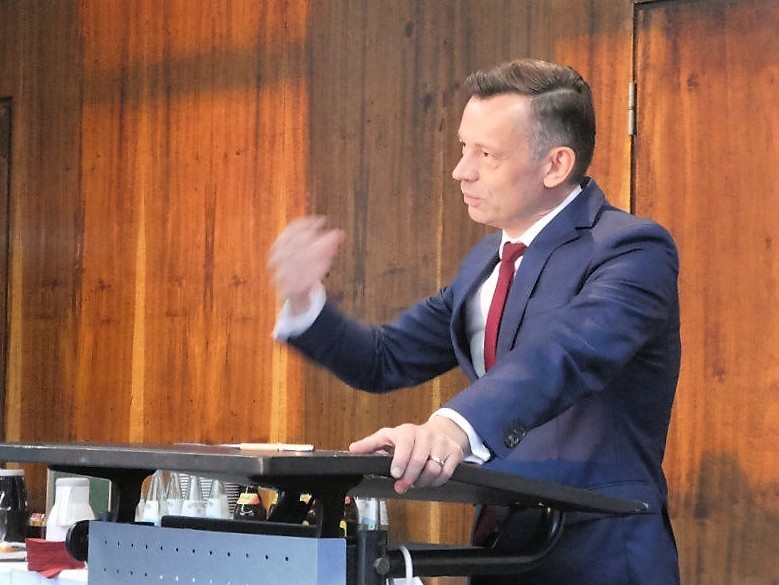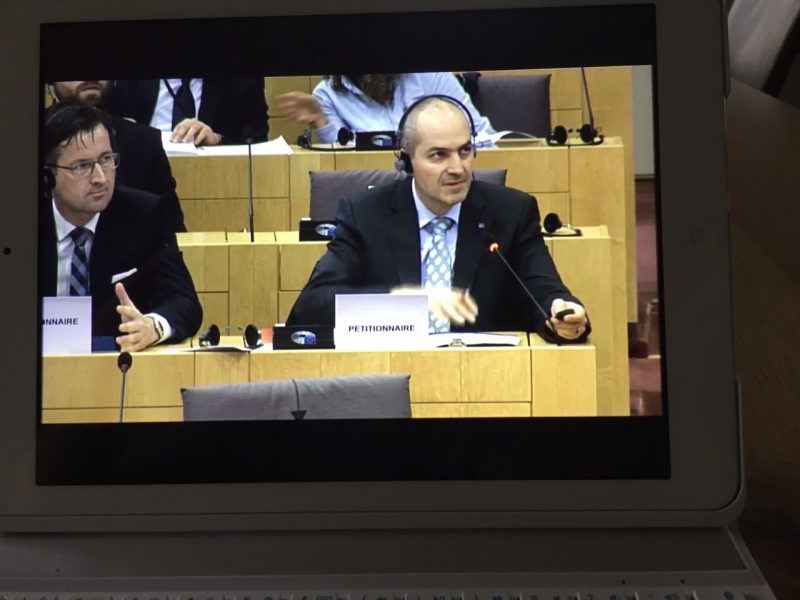Respect of the European Central Bank for the Charter of Fundamental Rights of the European Union
Detailed documentation
in German Language here.
Open petition to the European Parliament: The European Central Bank may be responsible through operational structure of its instruments for violations of the Charter of Fundamental Rights of the European Union.
The petition is described and discussed in English in the publication The European Central Bank and Its Role in a Sustainable Finance System (Springer 2023) – A preprint of the publication can be found here for direct download.
In their latest hearing about the petition on 1.12.2021, the EU committee of petitions decided to ask Christine Lagarde again, to take a stand to the raised questions about violations of the Charter of Fundamental Rights. Here you find petents notes: EU-Petition-429-2017_BolsingerMinnemann_Speech2021 And here you can watch the whole hearing:
„The regulatory framework of the EU Charter of Fundamental Rights has been valid law since the Treaty of Lisbon – also for the ECB! Since 2017, the EU Petitions Committee has been dealing with the implementation of this simple truth. On 1.12.2021, the Petitions Committee of the European Parliament had another opportunity to finally establish justice for all financial market players and to make it clear to the European Central Bank, that the EU Charter of Fundamental Rights must also be adhered in all its transactions. Sustainability in the financial market cannot be implemented by commercial banks alone, but requires first and foremost a credible central bank that sets a good example instead of talking its way out of it. Not only climate protection is relevant, but all areas that were already bindingly fixed in the Charter of Fundamental Rights in 1999!“
After the course of the petition so far it seems obvious that the ECB will only take care of this problem if it is sued and loses or if there is political intervention on the part of the EU Commission and the EU Parliament. For the necessary legal adjustments to solve the problem, Arınç Onat Kılıç from the University of Antwerp in Belgium has presented an excellent consideration that can be helpful to the EU Commission and EU Parliament in changing the legal framework of the ECB. Only the Petitions Committee of the EU Parliament can clarify politically what status fundamental rights must really have at the central bank, because a lawsuit as a private individual seems to have no prospects.
Beginning of May 2023 we have asked the EU-Top-Decision Makers personally with this open letter (see here as pdf: 202304_UrsulavonderLeyen_geschwärzt) to stop the violations of “Fundamental Rights in the Eurosystem
Dear …
Since 2017, we have been drawing attention to the unlawful neglect of the EU Charter of Fundamental Rights in the Eurosystem. We sincerely ask you to use your political weight to stop the promotion of fundamental rights violations in the Eurosystem as soon as possible. The fundamental rights of the European Union can be systematically undermined with a financial volume of currently € 17 trillion (= securities/marketable assets) – we are sure that you are aware of the implications of that.
A petition in the European Parliament about that problem has been open and unresolved for six years. In our research, we have discussed experiences with the handling of the simple and legitimate request to consistently apply fundamental rights in the European Central Bank as well. A preprint of the reference book about that, which will be published in June, is available […] as an excerpt free of charge online […]
The consistent application of the Charter of Fundamental Rights in the European financial system is a basic prerequisite for the sustainability strategy of the European Union. It reflects not only the credibility of your personally taken oath of office, but also the credibility of all European institutions: Are European values consistently considered and implemented in all our institutions?
Please let us know when and in what form [you] will start to redesign instruments of the European Central Bank to match with EU Fundamental Rights.
With kind regards
Global Ethic Research Group on Finance and Economics
Prof. Dr Johannes Hoffmann, Prof. Dr Harald J. Bolsinger, Dr. Bernd Villhauer
(Founding Board, Chairman) (Advisory Board, Regulatory Policy) (Board, Director Research)”
The letter was sent to:
- President of the European Council
Charles Michel - President of the European Commission
Ursula von der Leyen - President of the European Parliament
Roberta Metsola - President of the Group of the European People’s Party
Manfred Weber - President of the Renew Europe Group in the European Parliament
Stéphane SÉJOURNÉ - President of the Identity and Democracy (ID) group in the European Parliament
Marco Zanni - Co-President of the Greens/EFA parliamentary group in the European Parliament
Terry Reintke - Co-President of the Left in the European Parliament – Group GUE/NGL
Martin Schirdewan - Co-Chairman of the European Conservatives and Reformists Group in the European Parliament
Ryszard Legutko - President of the Progressive Alliance of Socialists & Democrats in the European Parliament
Iratxe García Pérez
September 23, 2023: The EU Petitions Committee sent an automated email at 5:32 today informing that the status of the petition has been set to “closed”. There seems nothing more to say…
________________________________________________________________________________
7.3.2018 (Translation of the document transmitted on 04.01.2018 in German language)
Summary and update of petition 0429/2017 to the European Parliament: European Central Bank (ECB) involved in a massive number of violations of the Charter of Fundamental Rights of the European Union through possession and trading of unethical securities.
Ladies and gentlemen,
you were asked by the European Parliament’s Committee on Petition 0429/2017 for an opinion. To make this easier for you, I have summarized the facts and attached an update of my study::[1]
Circumstances:
The ECB is playing a major role in undermining the most fundamental values of the European Union by accepting questionable securities as collateral for its monetary policy operations. The effects of this action have a significant influence on the development of the European Union due to its large transaction volume. Therefore, the ECB and its agents must refrain from trading in and holding securities related to infringements of the Charter of Fundamental Rights of the European Union.
4,781 Banks and savings banks were obliged in the euro area in 2017 to hold minimum reserve assets with the ECB (or its national central bank). A further 2,493 financial institutions and funds were listed business partners of the ECB for refinancing operations. This meant that 7,274 banks, savings banks, money market funds and financial institutions, including national central banks, were obliged to hold so-called eligible collateral for monetary policy transactions with the ECB in their portfolios. The traded volume of these securities currently stands at around €14 trillion and is thus a major lever for or against the realisation of European values in the real economy. The ECB (or the respective national central bank as vicarious agent) becomes the owner of the relevant securities as a pledgee eligible collateral. Trade in and possession of securities which undermine the Charter of Fundamental Rights of the European Union is detrimental to the European Union. For a European institution such as the ECB, this is unacceptable and cannot be justified by independence in monetary policy. [2]
Supporting Documents:
The ECB’s website provides access to its daily updated list of marketable collateral accepted as collateral for monetary policy operations (= marketable eligible collateral). In addition, there are also unpublished, non-marketable securities that meet the eligibility criteria and are accepted as collateral. The marketable securities of all issuers meeting the central bank eligibility criteria on January 3,2018 were examined by the independent sustainability rating agency oekom research AG (oekom) on January 4,2018 with daily ratings. Of the 29,445 securities, 25,111 were examined with daily ratings, which corresponds to a coverage ratio of 85%. Once again, the investigation focused only on serious and very serious ethical controversies of the aspects of the EU Charter of Fundamental Rights, which were examined in 2017 (Article 32 Child Labour; Article 37 Environmental Protection; Article 5 Violations of human rights, such as forced labour; tax avoidance and corruption). The audit again revealed the following alarming results (and thus an increase in infringements):
Type of controversy: number of securities in the ECB register of marketable
collateral:
Serious controversies in business conduct regarding…
- Tax payments 4,481 securities
- Cash transactions 1,592 securities
- Corruption 936 securities
- Environmental protection 480 securities
- Human rights violations 72 securities
- Production of outlawed weapons 16 securities
Remedy:
In order to remedy the deplorable state of affairs simply and effectively, the permanent non-infringement of the EU Charter of Fundamental Rights must be included in the criteria for eligible collateral as a condition for admission. Compliance with the EU Charter of Fundamental Rights is regularly verified by a current ethical rating. In terms of competition policy, the ethical rating can be transparently mapped by means of the independent ethical ratings already available on the market from established rating agencies to which the ECB and all other financial market players have access at all times.
Reasons:
The existence of the EU Charter of Fundamental Rights implies a natural obligation for the ECB to proceed as proposed above. Since my analysis of marketable central bank eligible collateral has revealed mass violations of the Charter of Fundamental Rights of the European Union, explicit inclusion of this European minimum morality in the ECB’s statutes is urgently needed. To date, the ECB and the European financial market have not been sufficient to enforce the Charter of Fundamental Rights of the European Union.
Sincerely,
Harald J. Bolsinger
[1] https://www.wirtschaftsethik.biz/zentralbank
[2] In accordance with Article 51 the ECB is bound by and not above the Charter of Fundamental Rights of the European Union.
_________________
The European Parliament is asked for regulation, so that there can be no more direct or indirect involvement in violations of the Charter of Fundamental Rights of the European Union by the European Central Bank.
The European Central Bank (ECB) is involved in undermining the most fundamental values of the European Union. This happens every day through the trade with securities violating the Charter of Fundamental Rights of the European Union. The impact of this action can have significant influence on the further development of the European Union due to the large transaction volumes of the ECB.
In the currently practiced collateral policy and asset purchase programs of the ECB most basic ethical aspects are not visible. No rating obligation exists for the consideration of such aspects. This is inappropriate for one of the most important institutions of the European idea and works directly against the political efforts to a decent, corruption-free, environmentally sensitive and sustainable European Union.
To resolve this situation, the ECB and all banks in the Eurosystem should be obliged to explicitly…
1 … ensure compliance with ethical minimum aspects in accordance with the Charter of Fundamental Rights of the European Union in all collateral transactions with the ECB
2 … create transparency for these transactions in the form of publicly available sustainability ratings.
The author of this petition evaluated 26.110 securities accepted by the ECB for minimum reserve with sustainability rating data from oekom research AG and found alarming results. There were thousands of points of critique in respect of …
- Controversies in business malpractice: Taxes (4.751)
- Controversies in business malpractice: Corruption (247)
- Controversies in business malpractice: Money transfers (2.023)
- Controversial environmental practices (181)
- Human & labour rights controversies (85)
- Controversies about the production of banned weapons (10)
The petition in German language with evaluation details is described here. It is registered on 15.05.2017 with the Nr. 0429/2017 under the title “Verpflichtung der Europäischen Zentralbank auf EU Grundrechtscharta“.
__________________________________________________________________________________
On 29.11.2019 experts discussed the topic in Frankfurt as following:
Sustainable Europe: The ECB as a cardinal error?
The ECB has an internationally unparalleled special role among central banks.
Frankfurt – At the meeting of the “Weltethos-Institut” Research Group on Economics and Finance in cooperation with financial market experts from the Goethe University in Frankfurt and the University of Applied Sciences in Würzburg-Schweinfurt (FHWS), the ECB’s ethical dimension as a body of the European Union was examined in detail for the first time. What was previously only known to experts: the European Commission shapes the ECB’s regulatory framework in the form of guidelines and the ECB is accountable to the European Parliament as a supervisory body. As a result, the ECB plays a special role among the central banks, that is incomparable at international level.
On 29 October 2019, experts discussed the ECB’s commitment to the Charter of Fundamental Rights of the European Union with the audience in the Eisenhower Hall of the Goethe University in Frankfurt, moderated by Gerhard Hofmann and Benedikt Hoffmann. Johannes Hoffmann, Bernd Villhauer, Harald Bolsinger, Michael Schmidt, Christian & Marian Szidzek, Patrick Weltin and Susanne Bergius used the most important perspectives to illustrate the monetary freedom and regulatory boundaries of Europe’s central bank. It became clear that monetary independence cannot be a licence for the ECB to disregard fundamental rights.
 Prof. Dr. Johannes Hoffmann, Goethe University and founder of the former research group Ethical Ecological Rating, now based at the Weltethos-Institut, impressively demonstrated the development of sustainable finance in Europe. Dr. Bernd Villhauer, Managing Director of the Weltethos-Institut at the University of Tübingen, thematized moral requirements for the ECB beyond monetary policy. The Würzburg business ethicist Prof. Dr. Harald Bolsinger from the FHWS gave insights into the relevance of fundamental rights in the core business of the ECB and reported on experiences with a relevant EU petition 429/2017 (see: http://bit.ly/2z1vsVj ).
Prof. Dr. Johannes Hoffmann, Goethe University and founder of the former research group Ethical Ecological Rating, now based at the Weltethos-Institut, impressively demonstrated the development of sustainable finance in Europe. Dr. Bernd Villhauer, Managing Director of the Weltethos-Institut at the University of Tübingen, thematized moral requirements for the ECB beyond monetary policy. The Würzburg business ethicist Prof. Dr. Harald Bolsinger from the FHWS gave insights into the relevance of fundamental rights in the core business of the ECB and reported on experiences with a relevant EU petition 429/2017 (see: http://bit.ly/2z1vsVj ).
 Bolsinger: “It is overdue urgeing the ECB to take European values into account in its financing and collateral practices. We must be able to expect the European Central Bank not to violate at least the values of the European Charter of Fundamental Rights in its core business.” Bolsinger says. On the way to a sustainable European financial system, respect for fundamental rights in the ECB’s business conduct must be at the beginning of all initiatives: “If the ECB acts as a role model within the framework of the Charter of Fundamental Rights, which is binding for the ECB anyway, she will have an impact on all financial market players. If she does not, then all other political initiatives for a more sustainable financial system will be wastepaper!”
Bolsinger: “It is overdue urgeing the ECB to take European values into account in its financing and collateral practices. We must be able to expect the European Central Bank not to violate at least the values of the European Charter of Fundamental Rights in its core business.” Bolsinger says. On the way to a sustainable European financial system, respect for fundamental rights in the ECB’s business conduct must be at the beginning of all initiatives: “If the ECB acts as a role model within the framework of the Charter of Fundamental Rights, which is binding for the ECB anyway, she will have an impact on all financial market players. If she does not, then all other political initiatives for a more sustainable financial system will be wastepaper!”
 Michael Schmidt, Chief Investment Officer (CIO) of Lloyd Fonds AG, then used the ECB’s successes to describe the safeguarding of price stability as the greatest good, for which the independence of the ECB was absolutely essential. The Sustainable Finance High Level Expert Group of the EU had not made any recommendations on central bank behaviour, as the ECB was independent and therefore recommendations in this direction were not in demand and could not be implemented, said Schmit. The Würzburg lawyers Dr. jur. Christian Szidzek and Marian Szidzek (thales-datenschutz.de) vehemently contradicted this and proved the duty of the ECB to observe fundamental rights also in its business conduct as an EU institution. They pointed out options for legal steps to make the ECB fulfilling her duty. Patrick Weltin, banking analyst at imug rating, took a look at the ECB’s sustainability in its core business, which could be greatly improved, and Susanne Bergius from Handelsblatt Business Briefing Sustainable Investments explained positive examples of progressive national central banks in Europe on the way to implementing sustainability in their core business. After a lively discussion with the experts and the audience, Prof. Dr. Johannes Hoffmann concluded with an appeal to apply the current regulatory framework of the ECB with regard to its fundamental rights obligation.
Michael Schmidt, Chief Investment Officer (CIO) of Lloyd Fonds AG, then used the ECB’s successes to describe the safeguarding of price stability as the greatest good, for which the independence of the ECB was absolutely essential. The Sustainable Finance High Level Expert Group of the EU had not made any recommendations on central bank behaviour, as the ECB was independent and therefore recommendations in this direction were not in demand and could not be implemented, said Schmit. The Würzburg lawyers Dr. jur. Christian Szidzek and Marian Szidzek (thales-datenschutz.de) vehemently contradicted this and proved the duty of the ECB to observe fundamental rights also in its business conduct as an EU institution. They pointed out options for legal steps to make the ECB fulfilling her duty. Patrick Weltin, banking analyst at imug rating, took a look at the ECB’s sustainability in its core business, which could be greatly improved, and Susanne Bergius from Handelsblatt Business Briefing Sustainable Investments explained positive examples of progressive national central banks in Europe on the way to implementing sustainability in their core business. After a lively discussion with the experts and the audience, Prof. Dr. Johannes Hoffmann concluded with an appeal to apply the current regulatory framework of the ECB with regard to its fundamental rights obligation.
On 11 November 2019 3 p.m., EU Petition 429/2017 was once again on the agenda of the Petitions Committee of the European Parliament in Brussels:
Committee on Petitions of the European Parliament decides on Würzburg “ECB fundamental rights petition”

On 11 November, the Würzburg business ethicist Professor Dr. Harald Bolsinger presented research findings on the European Central Bank’s (ECB’s) compliance with fundamental rights to the Brussels Petitions Committee of the European Parliament and appealed to parliamentarians to encounter the Eurosystem’s ethical blindness politically. According to his research, around 20 percent of the securities that the ECB accepts as collateral for loans to commercial banks are subject to serious ethical controversy. The cases range from child labour, forced labour, corruption, tax avoidance and environmental destruction to allegations of terrorist financing and the manufacturing of weapons. The market volume of the securities examined amounts to around EUR 14 trillion and thus has a significant influence on the reality of life of EU citizens.
After recommendations by the European Commission, representatives of the political groups in Parliament commented on the demands of Petition 0429/2017, stressing its fundamental importance for the sustainable direction of the European Union and deciding to pursue the matter politically. Bolsinger’s demands will be discussed with the new ECB leader and also in the Economic and Monetary Affairs Committee of the European Parliament.
“It is a stroke of luck that the resubmission of the petition to the Committee on Petitions has lasted from 2017 to the present,” Bolsinger comments, as the opportunity for change through new policies by Christine Lagarde now exists for the ECB, Vladis Dombrowvskis for the Commission and new leaders in the parliamentary Economic and Monetary Affairs Committee. “Never before in the history of the EU has the central bank created transparency for the Parliament about the fundamental rights compliance of its portfolios, although transparency and credible communication in all areas are the most important elements of successful central banking “, Bolsinger explained his demands and continued: “I hope that Mrs Lagarde will make the ECB a role model for all central banks worldwide on this point and that our EU Parliament will be able to gain a lasting picture of the significance of European core values in the core business of the central bank on the basis of reliable data”. The regulatory framework of the EU Charter of Fundamental Rights has been valid law for the ECB since the Treaty of Lisbon, explains the business ethicist of the Faculty of Economics at the FHWS.
2019 Recording of the meeting of the Committee on Petitions (from minute 15:11):
https://www.europarl.europa.eu/streaming/?event=20191111-1500-COMMITTEE-PETI
2021 Recording of the meeting of the Committee on Petitions:

